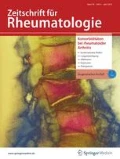Zusammenfassung
Ziel des Rheuma-Netzwerks ADAPTHERA („risikoadaptierte Rheumatherapie“) ist es, eine flächendeckende Verbesserung der rheumatologischen Versorgung durch Koordination der Behandlung in einem landesweiten, transsektoralen Netzwerk zu erreichen. Begleitende biomedizinische Forschungsprojekte, Schulungskonzepte sowie der Aufbau eines Rheumaregisters (Daten- und Biomaterialsammlung) sollen darüber hinaus für eine stetige und nachhaltige Optimierung der Versorgung sorgen. In der Pilotphase 2012–2015 lag der Fokus des als „Landesleitprojekt“ im Rahmen der Initiative Gesundheitswirtschaft Rheinland-Pfalz (RL-P) geförderten ADAPTHERA Netzwerkes auf der Optimierung der Frühdiagnose der rheumatoiden Arthritis, bei der bekanntermaßen ein erhebliches Versorgungsdefizit besteht.
Durch die intensive, dauerhafte und koordinierte Kooperation aller Versorgungspartner auf dem Gebiet der Rheumatologie (niedergelassene Hausärzte und Orthopäden, niedergelassene Schwerpunktrheumatologen, das ACURA-Rheumazentrum RL-P, die Universitätsmedizin Mainz, die Rheumaorthopäden sowie die Arbeitsgemeinschaft Rheumatologie RL-P) ist ein bundesweit einzigartiges flächendeckendes Angebot mit nachweisbarer Versorgungsoptimierung in Rheinland-Pfalz entstanden. Unterstützt wurde das Netzwerk dabei durch die hervorragende Zusammenarbeit mit der Kassenärztlichen Vereinigung RL-P und der Selbsthilfeorganisation Rheumaliga. Die bei Projektstart gesetzten Ziele werden am Ende der Pilotphase erreicht:
- deutliche Verbesserung der Frühdiagnostik der rheumatoiden Arthritis (durchschnittlich 23,7 Tage Dauer bis zur Diagnosestellung durch Rheumatologen)
- krankenkassenübergreifender Zugang (unabhängig von einer bestimmten Kasse)
- flächendeckend (nachweislich Teilnahme von Hausärzten aus ganz RL-P)
- Aufbau von Daten- und Biomaterialiensammlung etabliert als Grundlage für Biomarkerforschung und Aufbau eines Rheuma-Registers Rheinland-Pfalz.
Abstract
The aim of the rheumatology network ADAPTHERA (“risk-adapted rheumatology therapy“) is to achieve a comprehensive improvement in rheumatology care by coordinating treatment in a regional, trans-sectoral network. Accompanying biomedical research projects, training concepts, and the construction of a rheumatology register (gathering data and biomaterials) should furthermore ensure the stable and sustainable optimisation of care. In the pilot phase (2012–2015) the focus of the ADAPTHERA network, required as a “regional key project“ within the framework of the Initiative on Health Economy of Rheinland-Palatinate (RL-P), Germany, was placed on the optimisation of the early diagnosis of rheumatoid arthritis, where it is well-known that there is a significant care deficit.
Through the intensive, stable, and coordinated cooperation of all health care partners in the field of rheumatology (registered general practitioners and orthopaedic specialists, registered core rheumatologists as well as the Association of Rheumatology of RL-P) a unique regional, comprehensive offer with verifiable care optimisation has been established in RL-P. The network is supported by outstanding collaboration with the Association of Statutory Health Insurance Physicians and the self-help organisation Rheumatology League.
The aims that were established at the start of the project will be achieved by the end of the pilot phase:
- significant improvement in the early diagnosis of rheumatoid arthritis (an average of 23.7 days until diagnosis by rheumatologists)
- access covering all health insurance (regardless of the particular scheme the patients belong to)
- comprehensive (verifiable participation of general practitioners from all over RL-P)
- data and biomaterials collection, established as a basis for biomarker research, and a rheumatology register for RL-P.






Literatur
Cush JJ (2007) Early rheumatoid arthritis – is there a window of opportunity? J Rheumatol 80(Suppl):1–7
Huscher D, Merkesdal S, Karger T et al (2006) Cost-of-illness in rheumatoid arthritis, ankylosing spondylitis, psoriatic arthritis SLE in Germany. Ann Rheum Dis 65:1175–1183
Schneider M, Krüger K (2013) Rheumatoide Arthritis –Frühdiagnose und Krankheitskontrolle. Dtsch Ärztebl 110(27-28):477–484
Schneider M, Lelgemann M, Abholz HH et al (2007) Interdisziplinäre Leitlinie Management der frühen rheumatoiden Arthritis. DGRH-Leitlinie, 2. Aufl. Steinkopf, Darmstadt
57. Kommission Versorgung der Deutschen Gesellschaft für Rheumatologie (2008) Memorandum rheumatologische Versorgung von akut und chronisch Rheumakranken in Deutschland. www.dgrh.de/Versorgung. Zugegriffen: 10. Feb. 2016
DRFZ, Epidemiologie, Kerndokumentation 2011
Langner H‑E et al (2009) www.mancario.de/literatur/Das_Duesseldorfer_Modell_Update_2013.pdf. Zugegriffen: 10. Feb. 2016
www.KV-RLP.de/adapthera. Zugegriffen: 10. Feb. 2016
Kommission Versorgung der DGRh 2008
Machold KP, Eberl G, Leeb BF et al (1998) Early arthritis therapy: rationale and current approach. J Rheumatol Suppl 53:13–19
Van der Linden MP, Le Cessie S, Raza K et al (2010) Long-term impact of delay in assessment of patients with early arthritis. Arthritis Rheum 62:3537–3546
Westhoff G, Edelmann E, Kekow J, Zink A (2010) Diagnosespektrum, Behandlungsindikation und Symptomdauer von Erstzuweisungen zum Rheumatologen. Z Rheumatol 69:910–918
Danksagung
Chugai Pharma für die finanzielle Unterstützung des Netzwerkaufbaus.
Prof. Dr. H.J. Lakomek für die kritische Begleitung des Projektes.
Author information
Authors and Affiliations
Corresponding author
Ethics declarations
Interessenkonflikt
A. Schwarting, B. Pfeiff, C. Amberger, D. Pick, M. Hesse, M. Jendro, J. Engels, A. Böttger, C. Kuhn, F. Trautmann, J. Majdandzic, W. Ziese, M.-L. Stadelmann, F. W. Kessler, H. Dinges, S. Ultes-Kaiser, U. Droste, M. Schmalhofer, A. Hazenbiller, M. Rector, J. Weinmann-Menke, K. Triantafyllias, M. Becker, M. Ataian, M. Lablans, F. Ueckert, T. Panholzer und M. Blettner geben an, dass kein Interessenkonflikt besteht.
Dieser Beitrag beinhaltet keine von den Autoren durchgeführten Studien an Menschen oder Tieren.
Additional information
Redaktion
U. Müller-Ladner, Bad Nauheim
U. Lange, Bad Nauheim
Rights and permissions
About this article
Cite this article
Schwarting, A., Pfeiff, B., Amberger, C. et al. Das landesweite Netzwerk ADAPTHERA. Z Rheumatol 75, 999–1005 (2016). https://doi.org/10.1007/s00393-016-0132-0
Published:
Issue Date:
DOI: https://doi.org/10.1007/s00393-016-0132-0

